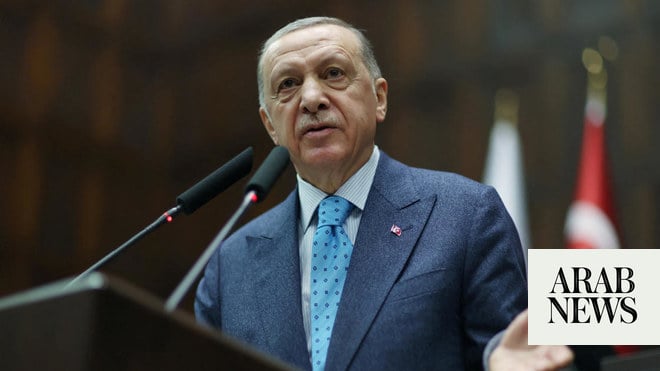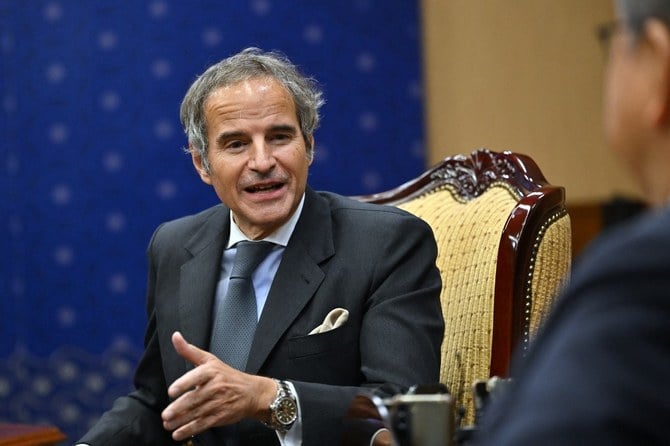
Turkish Foreign Minister Hakan Fidan on Wednesday warned that the Middle East is “at a turning point,” adding: “We will either move toward a larger war or a greater peace.” This statement was critical because a larger war involving regional states and nonstate actors would be a dire scenario. This situation is compelling Middle Eastern countries to focus on a second option: finding ways to achieve a greater peace.
One of these approaches was put forward by Ankara. Turkiye’s top diplomat has engaged in shuttle diplomacy over the past week, visiting Egypt, Lebanon, Saudi Arabia, the UAE and Qatar. During his visit to Egypt, he proposed a new mechanism of guarantors to resolve the decades-long Israeli-Palestinian issue and suggested Turkiye could be one of the guarantors.
This proposal is very important, as it seems to be one of the most effective and concrete so far put forward, particularly given the deep divisions within the international community over the conflict. While some parties are exacerbating tensions, others are striving to achieve a ceasefire as quickly as possible to prevent the crisis from spreading throughout the region. Turkiye and the countries that view its guarantor proposal positively definitely belong to the second group. To date, no other country has put forward a proposal that is as constructive.
The messages conveyed by Ankara this week made it evident that Turkiye is ready to act as a guarantor for the Palestinian side. Turkish President Recep Tayyip Erdogan, in his strongest comments on the conflict since the events of Oct. 7, stated that Hamas is not a terrorist organization but a liberation group fighting a battle to protect Palestinian lands and people. Erdogan’s statement came after several reports claimed that Ankara had asked Hamas members in Turkiye to leave the country; claims that were denied by the Turkish side.There are actors in the first group that are fanning the flames of the ongoing conflict, primarily the Western backers of Israel. France, for example, proposed expanding the Global Coalition Against Daesh, created in 2014, to fight Hamas as well. Israel is not a member of this coalition. French President Emmanuel Macron’s proposal, made during a visit to Israel, took regional states by surprise, especially since many said they had not been consulted. However, associating Hamas with Daesh would be considered unacceptable in Palestine and highly inflammatory in the region, as several actors have been involved in discussions with the group regarding the release of hostages and ending the conflict.
Oct. 7 marked a turning point for the Middle East, altering the dynamics of Turkish foreign policy as well as the region’s balances. Ankara had been in the process of normalizing relations with Israel, while some other regional countries were also considering such a move. Erdogan, for instance, said he had canceled a plan to visit Israel due to its inhumane war on Gaza. Moreover, Erdogan is expected to participate in a massive rally in Istanbul on Saturday to defend the rights of Palestinians.
Erdogan has also proposed an international peace conference for the Israeli-Palestinian conflict. Turkiye hosted a similar international conference on Palestine in late 2017, in which all influential actors in the region participated. There is currently widespread solidarity with the Palestinian people in Turkiye, both at the state and public levels. Fidan’s proposal of the country being a guarantor for peace aligns with this context.However, within the framework of the guarantor formula, there must also be a guarantor for Israel. Turkiye seems to view the US, which is also in favor of a two-state model, as a suitable candidate for this role, although Washington is playing a very different tune at the moment. The involvement of a Western state in the diplomatic process is essential for achieving a ceasefire and a peace settlement that all actors can accept. While the regional countries’ efforts are crucial, the participation of Western actors — as long as they aim to ease tensions, not fan the flames — could be a game-changer.
But it would be naive to expect much from the Western world, given its conflicting stances on Syria, Libya and elsewhere. Most Western politicians, for the sake of their political interests, have offered unconditional support to Israel, following in the footsteps of the US. However, this ongoing conflict puts the interests of the Western actors in jeopardy, as its expansion into a regional war would harm their interests.
Therefore, the involvement of Western states that have adopted a balanced policy toward the conflict, such as Spain, Italy and Greece, is important this time, for the sake of Palestine and the region. Fidan’s meeting with his German counterpart, Annalena Baerbock, during his visit to Egypt was important in this regard. It must be assumed that Fidan discussed the guarantor proposal with her. While there has not yet been any enthusiasm from the Western world regarding the Turkish proposal, Russia has expressed its readiness to discuss and consider Ankara’s initiative.
The guarantor system entails substantial responsibilities and duties. It requires a mechanism of dialogue in case one side violates its rules. Therefore, when a ceasefire is achieved, who assumes the guarantor role is highly important. Although it remains uncertain whether the guarantor proposal will be reciprocated, at the very least it is a proposal that could be possible if Western actors genuinely considered being part of it.












